United States
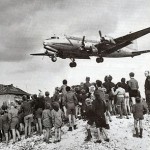 I think that every nation has opportunities to do what can be labeled as defining moments…situations when the nation dealt with an enemy or situation so well, that it can only be considered amazing. That was how the United States reacted to one of the most dramatic standoffs in the history of the Cold War. The Soviet Union decided to block off all road and rail traffic to and from West Berlin, Germany. The move was designed to basically starve the people into submission…or at least that was the plan. It was also a move that would be in defiance to all the other allies in Germany at the time. Unfortunately for the Soviet Union, the blockade turned out to be a horrible diplomatic move, but for the United States, it became a defining moment. The United States emerged from the confrontation with a renewed purpose and confidence, as well as a reputation for being a humanitarian nation.
I think that every nation has opportunities to do what can be labeled as defining moments…situations when the nation dealt with an enemy or situation so well, that it can only be considered amazing. That was how the United States reacted to one of the most dramatic standoffs in the history of the Cold War. The Soviet Union decided to block off all road and rail traffic to and from West Berlin, Germany. The move was designed to basically starve the people into submission…or at least that was the plan. It was also a move that would be in defiance to all the other allies in Germany at the time. Unfortunately for the Soviet Union, the blockade turned out to be a horrible diplomatic move, but for the United States, it became a defining moment. The United States emerged from the confrontation with a renewed purpose and confidence, as well as a reputation for being a humanitarian nation.
When World War II ended, Germany was divided into occupation zones. The United States, Great Britain, the Soviet Union, and eventually France were granted specific zones to occupy. Each nation was there to accept the surrender of Nazi forces and restore order. The Soviet Union occupied most of eastern Germany, and the other 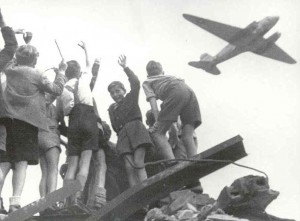 Allied nations occupied western Germany. The German capital of Berlin was divided into four sections as well. The differences between the United States and the Soviet Union were immediately evident. The Soviets were intent on thoroughly breaking the Germans…making them neutral and disarmed. Punishment was going to be at the top of the list. The United States saw things differently. They believed that the economic recovery of Western Europe depended of a strong, reunified Germany. The United States also felt that a rearmed Germany was going to be a stiff deterrent to further Soviet expansion into Western Europe. In May 1946, the Americans stopped reparations shipments from their zone to the Soviets. In December, the British and Americans combined their zones; the French joined some months later. The Soviets viewed these actions as a threat and issued more demands for more say in the economic future of Germany. On June 22, 1948, negotiations between the Soviets, Americans, and British broke down. On June 24, Soviet forces blocked the roads and railroad lines into West Berlin.
Allied nations occupied western Germany. The German capital of Berlin was divided into four sections as well. The differences between the United States and the Soviet Union were immediately evident. The Soviets were intent on thoroughly breaking the Germans…making them neutral and disarmed. Punishment was going to be at the top of the list. The United States saw things differently. They believed that the economic recovery of Western Europe depended of a strong, reunified Germany. The United States also felt that a rearmed Germany was going to be a stiff deterrent to further Soviet expansion into Western Europe. In May 1946, the Americans stopped reparations shipments from their zone to the Soviets. In December, the British and Americans combined their zones; the French joined some months later. The Soviets viewed these actions as a threat and issued more demands for more say in the economic future of Germany. On June 22, 1948, negotiations between the Soviets, Americans, and British broke down. On June 24, Soviet forces blocked the roads and railroad lines into West Berlin.
When the Soviets blocked the roads and railways, the Americans were furious. The question now became, what to do about it. Inside West Berlin there was panic. The people thought they were going to die. For a few tense 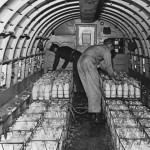 days, the world waited to see what the United States would do next. Then, just two days after the Soviets began the blockade, the United States reacted in a way that was so unexpected, and in the end, it would be a way that brought about that defining moment, and really set the stage for the humanitarian reputation the United States has today. A massive airlift of supplies was sent into West Berlin in what would become one of the greatest logistical efforts in history. For the Soviets, the escapade quickly became a diplomatic embarrassment. They looked like an international bully that was trying to starve men, women, and children into submission. The successful American airlift merely served to accentuate the technological superiority of the United States over the Soviet Union. On May 12, 1949, the Soviets officially ended the blockade.
days, the world waited to see what the United States would do next. Then, just two days after the Soviets began the blockade, the United States reacted in a way that was so unexpected, and in the end, it would be a way that brought about that defining moment, and really set the stage for the humanitarian reputation the United States has today. A massive airlift of supplies was sent into West Berlin in what would become one of the greatest logistical efforts in history. For the Soviets, the escapade quickly became a diplomatic embarrassment. They looked like an international bully that was trying to starve men, women, and children into submission. The successful American airlift merely served to accentuate the technological superiority of the United States over the Soviet Union. On May 12, 1949, the Soviets officially ended the blockade.
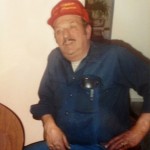 In the United States, you don’t often expect to become friends with a Russian man, but that is exactly what happened with my dad, Allen Spencer. Dad was working at WOTCO in Casper at the time, and his friend, Vladimir worked there as well. For Vladimir, the United States was the epitome of the word freedom. He loved the United States, and as an immigrant, who loved the United States, he wanted to learn the language. He was working very hard on it when he and my dad met. Dad was excited about Vladimir too. He had never known anyone from Russia, and really, never expected to. He told Mom and my younger sister, Allyn Hadlock that there was a Russian man working with him and he wanted to learn Russian so he could talk to him.
In the United States, you don’t often expect to become friends with a Russian man, but that is exactly what happened with my dad, Allen Spencer. Dad was working at WOTCO in Casper at the time, and his friend, Vladimir worked there as well. For Vladimir, the United States was the epitome of the word freedom. He loved the United States, and as an immigrant, who loved the United States, he wanted to learn the language. He was working very hard on it when he and my dad met. Dad was excited about Vladimir too. He had never known anyone from Russia, and really, never expected to. He told Mom and my younger sister, Allyn Hadlock that there was a Russian man working with him and he wanted to learn Russian so he could talk to him.
Dad bought a Russian/English dictionary, and began to study it. He had some specific phrases he wanted to learn, such as, Hello, How are you, Do you like America, and Do you have a family. Every night they sat down at the table to work through the dictionary, figuring out what he would say next. They also learned that certain symbols, 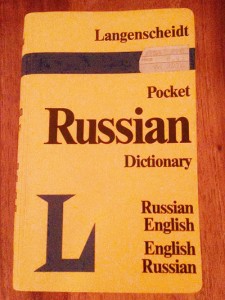 some that we use today, could mean something very different in Russian. The American symbol for “ok” is a good example. In Russian that symbol, with the circle of the thumb and forefinger, is a cuss word. It is very similar to flipping someone the bird. They laughed about that one. Then, when Dad wanted to say Dirty Rat, Allyn told him to use that American symbol for ok, because that should do it. That really got them laughing, and it still makes Allyn laugh to this day when she thinks about it.
some that we use today, could mean something very different in Russian. The American symbol for “ok” is a good example. In Russian that symbol, with the circle of the thumb and forefinger, is a cuss word. It is very similar to flipping someone the bird. They laughed about that one. Then, when Dad wanted to say Dirty Rat, Allyn told him to use that American symbol for ok, because that should do it. That really got them laughing, and it still makes Allyn laugh to this day when she thinks about it.
I think the thing that Vladimir liked so much about my dad was the fact that he tried to learn Russian, and that he reached out to a foreigner too. Vladimir and his wife didn’t have very many people that he could visit with…at least not in Russian. He was just so pleased that Dad was actually learning Russian. I’m not saying that Dad was fluent at Russian. In fact, his Russian could be considered comical at times, but the main thing was that he tried. Dad and Vladimir became the best of friends, and mom and Vladimir’s wife were friends too. They were invited to dinner at Vladimir’s house, and his wife made Borscht. Borscht is a beet soup. Now, I have to tell you that Dad must have really felt a friendship with Vladimir, because Dad hated beets, but he ate that soup. They told Mom and Dad that in Russia the people didn’t have very much meat, so their meals consisted of potatoes and vegetables. They were able to buy more meat now 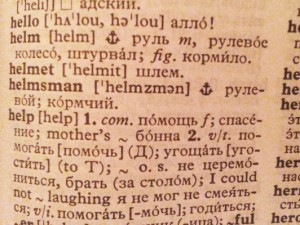 though, since coming to America, so when they had their American friends over for dinner, they bought meat for the Borscht…mostly because Americans are used to eating meat.
though, since coming to America, so when they had their American friends over for dinner, they bought meat for the Borscht…mostly because Americans are used to eating meat.
Vladimir and his wife wanted to be like the American people, because they loved this country. The did their very best to Americanize everything they did, because they wanted to be true Americans. This was the true melting pot…every foreigners dream, and they wanted to be a part of it. Dad and his Russian co-worker became good friends, and Vladimir always appreciated Dad’s efforts to make him feel at home in a new land.
 By the late 1960s, space travel had become a pretty common story for the people of the United States. NASA had enjoyed a relatively accident free space travel history, having only lost three astronauts, and that was a fire on the launch pad during training. So, when it came to Apollo 13 going to the Moon, which had been done twice before, the networks decided that it was boring, and opted not to televise the program…until disaster changed everything. For me, it seems impossible that anyone could think that space flight is boring, but someone at the top ranking position in the media, had made an executive decision, so that was the end of it.
By the late 1960s, space travel had become a pretty common story for the people of the United States. NASA had enjoyed a relatively accident free space travel history, having only lost three astronauts, and that was a fire on the launch pad during training. So, when it came to Apollo 13 going to the Moon, which had been done twice before, the networks decided that it was boring, and opted not to televise the program…until disaster changed everything. For me, it seems impossible that anyone could think that space flight is boring, but someone at the top ranking position in the media, had made an executive decision, so that was the end of it.
On April 11, 1970, Apollo 13, the third manned lunar landing mission was launched from Cape Canaveral, Florida, carrying astronauts Jim Lovell, Jack Swigert, and Fred Haise. If you’ve ever seen the movie “Apollo 13”, you will know that Jack Swigert had replaced Ken Mattingly, who had been exposed to the German measles. Ken would never get the measles, but rather was a part of the NASA team effort that worked to bring the stranded astronauts back home safely. The crew planned to land on the Fra Mauro highlands of the moon, but two days into the mission, disaster struck when oxygen tank number 2 blew up in the spacecraft, after Jack Swigert was told to preform a cryo stir procedure to the oxygen tanks…a routine maintenance procedure. Then, Swigert uttered those now famous words, “Houston, we’ve had a problem here.” After evaluation, it was determined that the normal supply of oxygen, electricity, light, and water had been disrupted. Their mission to land on the Moon was over, and now they had a new mission…survival!!
Suddenly the news media was very interested in this mission. A successful mission was boring and not news worthy at all, but one in which fatalities might occur, is very interesting. Sad really…when you think about it. The television stations were supposed to broadcast a segment the crew did about life in space, but while the crew did their segment, the stations decided not to broadcast it for lack of interest. Nine minutes later, when disaster struck, everyone was suddenly very interested. I guess I just don’t understand why we would rather watch news about a disaster, than a successful space mission. I don’t think there is anything common about space travel, and yet, it goes on a lot in our world, completely without notice.
Once the disaster began, the world watched anxiously, praying for the safe return of these brave men. The broken vehicle could not make the trip, and they would have to use the lunar landing module, Oddesy to get them home. They limped along, making the necessary “MacGyver” like connections and adjustments to allow them to have enough oxygen. They made “controlled burns” using the Earth as a guide. Not very controlled at all. It took tremendous effort on the parts of many people, but it all paid off, when on April 17, tragedy turned to triumph as the Apollo 13 astronauts touched down safely in the Pacific Ocean. It was a successful failure, in that no lives were lost.
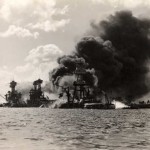 As the 73rd anniversary of the Japanese attack on Pearl Harbor dawns, I have to wonder why it is that the United States always feels that the other side must attack us first, and only then can we attack them. I know this is not always the case, but it seems like that is often the case. We try to be the peacemakers, and going to war is never something that we take lightly. Killing people is a horrible step to take. So, we always give warning after warning before we finally move, and even then it is usually too late to be the first to strike. I understand that the one who strikes first often looks like the bad guy, but it also seems like so often we are given much advance warning that a strike is eminent, and yet we wait…usually until after the attack happened and many people are dead, and the rest of us, while really angry, are too busy picking up the pieces to think about an immediate retaliatory strike.
As the 73rd anniversary of the Japanese attack on Pearl Harbor dawns, I have to wonder why it is that the United States always feels that the other side must attack us first, and only then can we attack them. I know this is not always the case, but it seems like that is often the case. We try to be the peacemakers, and going to war is never something that we take lightly. Killing people is a horrible step to take. So, we always give warning after warning before we finally move, and even then it is usually too late to be the first to strike. I understand that the one who strikes first often looks like the bad guy, but it also seems like so often we are given much advance warning that a strike is eminent, and yet we wait…usually until after the attack happened and many people are dead, and the rest of us, while really angry, are too busy picking up the pieces to think about an immediate retaliatory strike.
That was exactly where the United States found itself on December 7, 1941. We had warned Japan over and over, and with the Hull Note came the final warning. Even the fact that we knew that they would not comply, and we were in essence declaring war on Japan, we trusted them to move slowly…hoping for them to have a change of heart or something. They, on the other hand, acted almost immediately…or at least as immediate as they could back in 1941. They sent their strike force toward Pearl Harbor, while also sending a decoy strike force toward Thailand, in an effort to throw us off. Convinced that Japan was planning an attack on Thailand, President Roosevelt sent Emperor Hirohito a telegram, requesting that “for the sake of humanity,” the emperor intervene “to prevent further death and destruction in the world.” We were trying to be the peacemakers.
After sending the telegram, President Roosevelt was enjoying his stamp collection with his personal advisor, Harry Hopkins, and they were discussing the Japanese refusal to honor the Hull Note. Hopkins suggested that America should strike first, but President Roosevelt insisted that we could not do that. In reality, it was already to late for us to strike first. The Japanese were already on their way to attack Pearl Harbor, and a significant portion of the Pacific Fleet was there, anchored like sitting ducks, waiting for the attack. The ambush would take out 18 U.S. ships. Those destroyed, sunk, or capsized were the Arizona, Virginia, California, Nevada, and West Virginia. More than 180 planes were destroyed on the ground and another 150 were damaged, leaving only 43 planes operational. The American casualties totaled more than 3,400, with more than 2,400 killed…1,000 on the Arizona alone. The Japanese lost fewer than 100 men.
It seems to me that it is so often the side that strikes first…swiftly and with the element of surprise…that fares the best in the end. The side who was unaware, or didn’t heed the warning signs was slaughtered. We have one of the greatest military forces on the face of the earth here in America, so should we really ever be taken by surprise like that? I don’t think we should. I believe that if the strongman gets so sure of his might that he forgets the need to be watchful and wise, then when he least expects it, the strongman is caught unaware, and can be taken…even if his might should have prevented it. The United States has long been that strongman, and yet it seems that because of our hesitation to strike first, we are attacked over and over without warning. Then and only then, it seems, will we attack them in retaliation.
It is a dilemma I suppose, and maybe that was where President Roosevelt was coming from. We are the bad 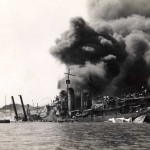 guys with the world if we attack first, and we are the bad guys with our own nation if we do not attack first. And, to top it off our intelligence isn’t always as reliable as it needs to be, so sometimes, such as on December the 7th, 1941, we are caught off guard, and completely by surprise, when we trusted an enemy to be as honorable as we try to be, and they feel no such obligation to honor. I guess that while we don’t like it when we are attacked without provocation, we must nevertheless, do the honorable thing, and not attack just because we anticipate an attack on us. If we were to do that, we would be no different than the nations we have to go to war with because they have invaded some other nation. Still, it is so hard to always be the nation that does the right thing, when we really don’t trust our enemies…because we know better.
guys with the world if we attack first, and we are the bad guys with our own nation if we do not attack first. And, to top it off our intelligence isn’t always as reliable as it needs to be, so sometimes, such as on December the 7th, 1941, we are caught off guard, and completely by surprise, when we trusted an enemy to be as honorable as we try to be, and they feel no such obligation to honor. I guess that while we don’t like it when we are attacked without provocation, we must nevertheless, do the honorable thing, and not attack just because we anticipate an attack on us. If we were to do that, we would be no different than the nations we have to go to war with because they have invaded some other nation. Still, it is so hard to always be the nation that does the right thing, when we really don’t trust our enemies…because we know better.
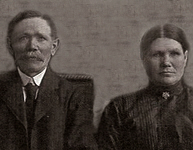 My great grandparents, Carl and Albertine Schumacher immigrated to the United States from Germany, before they even knew each other. When they arrived, they, like most immigrants, could not speak English very well. It made communication difficult in those early years. Eventually, they learned enough English to get by, but the family still spoke German in the home. German continued to be the home language for many years. In fact, it would take a teacher at the school where their two oldest children, Anna and Albert attended, who made fun of their language, to change their home life forever. When the children came home upset about the thoughtlessness of the teacher, my great grandmother, said, “That’s it!! From now on, this family will speak only English in this house!” She did it to protect her children from further ridicule, but looking back on that time now, I think it is a bit sad that the German language that had been a part of their heritage for generation and generations, was now lost forever. I know that my great grandparents probably always remembered the language, but for their children much of it was lost, and for their children, it was completely lost.
My great grandparents, Carl and Albertine Schumacher immigrated to the United States from Germany, before they even knew each other. When they arrived, they, like most immigrants, could not speak English very well. It made communication difficult in those early years. Eventually, they learned enough English to get by, but the family still spoke German in the home. German continued to be the home language for many years. In fact, it would take a teacher at the school where their two oldest children, Anna and Albert attended, who made fun of their language, to change their home life forever. When the children came home upset about the thoughtlessness of the teacher, my great grandmother, said, “That’s it!! From now on, this family will speak only English in this house!” She did it to protect her children from further ridicule, but looking back on that time now, I think it is a bit sad that the German language that had been a part of their heritage for generation and generations, was now lost forever. I know that my great grandparents probably always remembered the language, but for their children much of it was lost, and for their children, it was completely lost.
When I was in school, I fell in love with the German language, and took it in school for four years. It was so interesting to me to speak the German language, but the biggest problem was that I had no one to speak it with at home. I can see how speaking one language in the home and another at school could have become a problem for my grandmother and great uncle. It would be hard for them to learn English when German was spoken in the home. I know that the opposite made it very hard for me. The only time I got to speak German was the hour I had class each day. It would be especially confusing for younger children. Nevertheless, I think it could be done, and would have been beneficial for all of the children.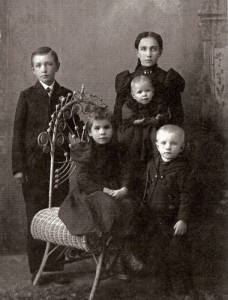
Over the years, I have been an advocate for English being our countries official language, and I still feel that way, but I also think it is great when people can speak more than one language. In my opinion, it is rude to speak another language in the company of people who cannot speak it back, because they invariably get the feeling that you are talking about them, and perhaps you are. Even if you aren’t, they will always believe you were. That is why I think it is important to consider those around you when choosing to speak a language that is not the common one to the area you are in. Of course, when you are not in a conversation with those around you, like in a grocery store, it’s a different thing. I think people should pass their heritage, culture, and language down to children and grandchildren, because it will never be something they regret giving them, but it is also important to embrace their new home when they immigrate, because that is where you will live, work, and socialize from then on.
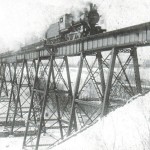 In their early years, the railroads were quite powerful companies, and with good reason. The railroad reduced travel time across the United States from days or months, to hours, in many cases. They brought supplies, payroll, and people from back east to the west quickly. The railroad did not come without some confusion, however. Even as late as the 1880s, most United States towns had their own system for keeping track of time, based on where the sun was at high noon. I had never given much thought to this, but I suppose it could have been a big mess, since the train’s arrival would be very mixed up, and the end result would be that the train might be scheduled to arrive in several places at once.
In their early years, the railroads were quite powerful companies, and with good reason. The railroad reduced travel time across the United States from days or months, to hours, in many cases. They brought supplies, payroll, and people from back east to the west quickly. The railroad did not come without some confusion, however. Even as late as the 1880s, most United States towns had their own system for keeping track of time, based on where the sun was at high noon. I had never given much thought to this, but I suppose it could have been a big mess, since the train’s arrival would be very mixed up, and the end result would be that the train might be scheduled to arrive in several places at once.
Because the railroads were quite powerful, they took it upon themselves to make a monumental change that would affect the entire nation, and Canada too. At exactly noon on this day in 1883, American and Canadian railroads broke the continent into four sections, and began using a system of time zones that we still use to this day, with very few changes made to it over the years. I’m sure there were people who did not like the new system much, but most people quickly embraced it, because their lives depended on the railroad in one way or another. The root of the problem they had was that they moved passengers and freight over the thousands of miles the line covered. With the varying times in towns along the route, the train 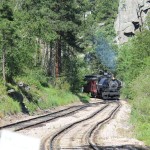 ended up with dozens of different departure and arrival times. No one really knew when the train would arrive…except possibly the engineer. I’m sure that caused chaos in the train stations…especially in the bigger cities. These days, we have to be at the airport two hours early for flights, because of screening, so imagine that kind of a scenario in the small train stations of the old west. This scheduling nightmare had to be stopped, and time zones were the only logical way to do it.
ended up with dozens of different departure and arrival times. No one really knew when the train would arrive…except possibly the engineer. I’m sure that caused chaos in the train stations…especially in the bigger cities. These days, we have to be at the airport two hours early for flights, because of screening, so imagine that kind of a scenario in the small train stations of the old west. This scheduling nightmare had to be stopped, and time zones were the only logical way to do it.
With the use of time zones, rail transportation became far more efficient. The thing that seems rather odd, is that they didn’t go to the United States or Canadian governments to resolve the problem, and if the government at that time was as inefficient as our congress is right now, I can fully understand why they didn’t. Imaging waiting six years to make a decision concerning time and its vital role in rail travel. Something had to be done right away, and the railroad was just bold enough to do it. As it turned out, no one tried to stop them either. I suppose everyone could see just how logical their plan was, and no one complained. So, the railroad companies agreed to create four continental time zones, and that decision has changed the way we live to this day.
The lines they adopted to make those time zones were very close to the ones we have today. I’m sure that any changes are based on where towns began to fall along the zone lines. It wasn’t until as late as 1918 that Congress officially adopted the railroad time zones and put them under the Interstate Commerce Commission. 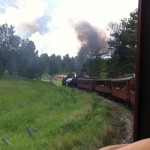 Just imagine, if you will, if the people and the railroad had waited for Congress to act on this matter. There would have been 35 more years of unorganized and frustrating railroad travel. Something that should have revolutionized travel, would have been relegated to the stone age again, because of Congress’ lack of action. Even after the system was implemented and people finally had an organized schedule, that was relatively accurate…because you can’t predict accidents or weather related delays very well, Congress sat on their hands, and I suppose they operated the government on government time instead. In this writer’s opinion, the time zones were a wonderful idea, and have benefitted this nation very well since 1883. My family has a long history of working on the railroad, and that is a fact that I am very proud of.
Just imagine, if you will, if the people and the railroad had waited for Congress to act on this matter. There would have been 35 more years of unorganized and frustrating railroad travel. Something that should have revolutionized travel, would have been relegated to the stone age again, because of Congress’ lack of action. Even after the system was implemented and people finally had an organized schedule, that was relatively accurate…because you can’t predict accidents or weather related delays very well, Congress sat on their hands, and I suppose they operated the government on government time instead. In this writer’s opinion, the time zones were a wonderful idea, and have benefitted this nation very well since 1883. My family has a long history of working on the railroad, and that is a fact that I am very proud of.
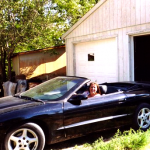 Driving home the other day, I started thinking about being in charge of such a machine as the automobile. At 15 years of age, most kids start learning to control this machine, and in a very short time, they are good at it. With the turn of a wheel and the press of a foot on a pedal, the car moves and the driver is in control. With careful and responsible use, the car can be maneuvered safely down life’s roads…and while driving it, we give little or no thought to just how amazing that is. A car is no small thing, and trucks are even bigger, and yet they are driven around by people who are pretty much one tenth of their size…sometimes less than that. Am I the only one who thinks about that?
Driving home the other day, I started thinking about being in charge of such a machine as the automobile. At 15 years of age, most kids start learning to control this machine, and in a very short time, they are good at it. With the turn of a wheel and the press of a foot on a pedal, the car moves and the driver is in control. With careful and responsible use, the car can be maneuvered safely down life’s roads…and while driving it, we give little or no thought to just how amazing that is. A car is no small thing, and trucks are even bigger, and yet they are driven around by people who are pretty much one tenth of their size…sometimes less than that. Am I the only one who thinks about that?
Before the invention of the automobile, people did control wagons and horse drawn carriages, but the horse had some say in what happened…at least to the extent that it wouldn’t usually go running off a cliff. And maybe  it wasn’t a good thing to have the horse involved exactly, because it could fight against the driver…unlike the automobile. Nevertheless, to have a machine that you have to control or it will go out of control, and to think that kids as young as fifteen are controlling that vehicle, is amazing and even mind boggling to me. And yet, it is being safely done every day.
it wasn’t a good thing to have the horse involved exactly, because it could fight against the driver…unlike the automobile. Nevertheless, to have a machine that you have to control or it will go out of control, and to think that kids as young as fifteen are controlling that vehicle, is amazing and even mind boggling to me. And yet, it is being safely done every day.
I’m not sure just why it sometimes hits me that driving a car every day is amazing, but it does. And when my kids and grandkids started driving, it seemed even more strange to me. How could they possibly know how to handle such a machine? They couldn’t possibly be ready or capable of such a thing, but the reality is that just like me, they were ready for it. There are approximately 30,000,000 drivers in the United States today, and if even a third of them are kids, there are about 10,000,000 kids driving their cars, and most generally keeping them in their own lane and on the road. I don’t say that driving a car is the safest way to travel, because like it  or not, that honor belongs to the airlines. Many people wouldn’t agree, but the numbers don’t lie.
or not, that honor belongs to the airlines. Many people wouldn’t agree, but the numbers don’t lie.
I know my thoughts sometimes seem a little odd, but the next time you get behind the wheel, contemplate for a moment just how amazing it is that you operate a piece of machinery that is about ten times your size and you do it while giving it almost no thought at all. I guess that our minds grasp many things, and driving a car doesn’t seem to be a particularly difficult one, since it is something we master at a relatively young age. A vehicle is a complicated piece of machinery with many things to master, but we have been doing it for a long time…truly amazing.
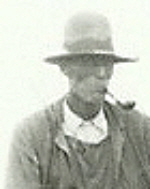 When I think about our organized military system, both during the years of the draft and now with our military being voluntary service, it occurs to me just how fortunate we, as a people, are to live where we do. There are so any evil leaders in countries who are not only enemies to the rest of the world, but in reality, enemies to their own people. In those countries, the military forces are not only not voluntary and not draft either, but rather they are forced into service, and often taken forcibly from their homes in the middle of the night, never to be seen again. Those taken are often children…even very young children, who are taken from their families and trained to be soldiers, or rather, trained killers. Their lives are viewed as unimportant. They are simply there to do the bidding of their evil government, and die doing it if necessary. They are expendable, because to replace them, the government simply goes out in the middle of the night and takes another child from another family by force. This was the position my great great grandfather, Stephan Beier found himself, his wife, Anna Maria Meier Beier, and their family in, one night in Russia. It was the reason that his family left Russia, and it was the reason my grandfather, Cornealius Byer was in the United States when he met my great great grandmother, Edna Fishburn in the Dakota Territory in the mid 1880’s.
When I think about our organized military system, both during the years of the draft and now with our military being voluntary service, it occurs to me just how fortunate we, as a people, are to live where we do. There are so any evil leaders in countries who are not only enemies to the rest of the world, but in reality, enemies to their own people. In those countries, the military forces are not only not voluntary and not draft either, but rather they are forced into service, and often taken forcibly from their homes in the middle of the night, never to be seen again. Those taken are often children…even very young children, who are taken from their families and trained to be soldiers, or rather, trained killers. Their lives are viewed as unimportant. They are simply there to do the bidding of their evil government, and die doing it if necessary. They are expendable, because to replace them, the government simply goes out in the middle of the night and takes another child from another family by force. This was the position my great great grandfather, Stephan Beier found himself, his wife, Anna Maria Meier Beier, and their family in, one night in Russia. It was the reason that his family left Russia, and it was the reason my grandfather, Cornealius Byer was in the United States when he met my great great grandmother, Edna Fishburn in the Dakota Territory in the mid 1880’s.
The family had been asleep and suddenly, they were awakened to the most horrifying event any family could ever imagine. Their son was taken at gun point, by soldiers. It was the Russian draft of the day. They did not care what his age was, nor did they care about any other qualifications, or the lack thereof. They needed more soldiers, and he had been chosen. I’m sure they had watched him for some time, along with watching many other young men his age. I don’t know how old he was at the time, but I do know that he was probably not out of school yet. What I do know is that my great great grandparents never saw their son again. My guess is that he probably lost his life in a battle somewhere within a year. The Russian leaders did not care about the soldiers…they were expendable…a dime a dozen, so their safety was unimportant. They were most likely sent into the worst battle zones, to fight the most likely to be lost battles. In that way, they government could keep their best officers and soldiers, the ones who had chosen to be there…if that was possible, safer from the worst battles. Or maybe, they put all the soldiers in the same harm’s way.
My great great grandparents were very distraught at the events of that night and they knew that they were not going to go through it again. The decision was made to secretly make their way out of Russia and go to the United States where their children could grow up safely, and if they were drafted into military service, they would be treated with dignity, and they would be able to stay in touch with their families. No parent is completely comfortable with their child going into military service, because if there is a war, their child will be in the middle of it. Nevertheless, they are proud of their child’s service…when it is done in the right way. To come into their home in the middle of the night, and forcibly take their child, knowing that they will never hear from that child again, is simply and horribly wrong. My great great grandparents decided that they were never going to go through it again. That is what made their decision to immigrate to the United States a move that was much less scary that the thought of staying in Russia. They never knew what happened to their son, and I’m certain that was something that stayed with them all their lives, but they knew they had done the right thing when they saw the rest of their family grow up and lead good lives in the United States.
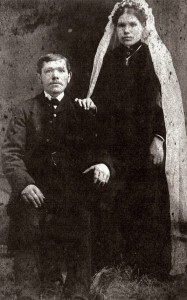 My great grandmother, Henriette Schumacher came to the United States reluctantly, with her sister, brother-in-law, and their two young children. Henriette’s mother had insisted that she go to help with the children. She was worried about the immigration to a new land so far away, and she figured that if both girls went, they could protect each other, and be company for each other. I think my great great grandmother knew her girls pretty well, and thought that the loneliness might be too much for either of them alone, and so going together would help to alleviate that loneliness. It was in the United States that my great grandmother would meet and marry my great grandfather, and would never again be sorry that she had come here.
My great grandmother, Henriette Schumacher came to the United States reluctantly, with her sister, brother-in-law, and their two young children. Henriette’s mother had insisted that she go to help with the children. She was worried about the immigration to a new land so far away, and she figured that if both girls went, they could protect each other, and be company for each other. I think my great great grandmother knew her girls pretty well, and thought that the loneliness might be too much for either of them alone, and so going together would help to alleviate that loneliness. It was in the United States that my great grandmother would meet and marry my great grandfather, and would never again be sorry that she had come here.
When the family moved from Minnesota to North Dakota, they bough some land, and would later move to a better piece of land, with a wonderful artesian well, that worked so well, that it formed a ten acre lake right near the family home. During his courtship of my grandmother, Anna, my grandfather, Allen Luther Spencer stocked the lake with a dozen small catfish from the river. For some years, the catfish were forgotten, until Carl and Henriette’s son, Fred noticed them. My great grandfather, Carl Schumacher built a flat bottomed boat for the three youngest children, who were the only ones living at home then, and they went fishing. By this time, the lake was teeming with catfish, and they practically jumped into the boat voluntarily. Great Grandma Schumacher would fry up those fish, and the family would have a feast. It was catfish that was fed to the threshers when they came too and Aunt Bertie says they tasted so good, that she can them from memory. Great Grandma rolled them in cornmeal and fried them in country butter, like only she could do. Aunt Bertie said she has never had catfish that could beat her mother’s. Great Grandma Schumacher was also the first one in the whole countryside to make fried chickens from young chickens. Before that everyone used mature chickens, which can be tough, they were stewed with dumplings.
When my great grandmother was in her early fifties, she got rheumatoid arthritis. Before very long, she was unable to do the things she used to do. A very short time later, that she was no longer the person who did the cooking, and while the girls tried to make those 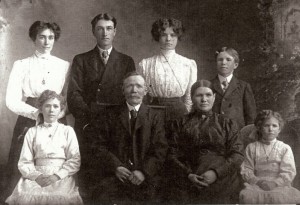 most loved foods taste the same as their mother had done all those years, they could never match the taste. It’s always sad when that happens. You can follow the recipe, but somehow, it just doesn’t taste the same. I think that is because, try as they might, most of those great cooks didn’t use a recipe, and writing it down is really their best guess at the quantities they used, and the person following the recipe is hard pressed to figure out the exact combination. I feel sorry for my aunts, uncle and great grandpa, because they remembered the way things used to be, but knew that they could never be that way again.
most loved foods taste the same as their mother had done all those years, they could never match the taste. It’s always sad when that happens. You can follow the recipe, but somehow, it just doesn’t taste the same. I think that is because, try as they might, most of those great cooks didn’t use a recipe, and writing it down is really their best guess at the quantities they used, and the person following the recipe is hard pressed to figure out the exact combination. I feel sorry for my aunts, uncle and great grandpa, because they remembered the way things used to be, but knew that they could never be that way again.
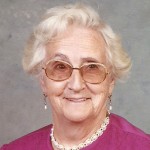 Since it is Saint Patrick’s Day, I decided to explore the Irish connection in our family. One of the main connections to Ireland that our family has comes from the Pattan family. I believe that the Shaw family who married into the Pattan family to become my ancestors, also came from Ireland, but I have no concrete information to corroborate my beliefs, as of right now. The Pattan name has changed over the years, and might be spelled Patton, Patten, or Pattan, as ours is. We have a number of Georges in our family, but I have found no connection to General George Patton, as of yet….not that it would surprise me if I did. Our family in America began, when John Pattan come over to the United States from Ireland in the early 1800’s, and the family has grown by leaps and
Since it is Saint Patrick’s Day, I decided to explore the Irish connection in our family. One of the main connections to Ireland that our family has comes from the Pattan family. I believe that the Shaw family who married into the Pattan family to become my ancestors, also came from Ireland, but I have no concrete information to corroborate my beliefs, as of right now. The Pattan name has changed over the years, and might be spelled Patton, Patten, or Pattan, as ours is. We have a number of Georges in our family, but I have found no connection to General George Patton, as of yet….not that it would surprise me if I did. Our family in America began, when John Pattan come over to the United States from Ireland in the early 1800’s, and the family has grown by leaps and 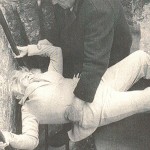 bounds since that time.
bounds since that time.
Before her death, my grandmother, Harriet Pattan Byer, and some of her siblings made the trip to Ireland to see the country of their ancestors, and hopefully to be able to connect with some of the family that might be still living over there. I don’t recall if they found any family or not, but I do know that they had a wonderful time. They explored the castles in the area…sometimes I wish we had castles. They kissed the Blarney Stone, which is a block of carboniferous limestone built into the battlements of Blarney Castle, and a must when visiting Ireland. They went out by the sea and into the towns, and they have a marvelous time.
I suspect that most of us have some Irish background, but many people may not know it. It seems to me that a lot of people have immigrated from Ireland over the years, and if that is the case, there are probably very few families who don’t have a least a little bit of the Irish in them, but then that could be a lot of blarney too. Nevertheless, Irish or not, most of us like to celebrate the wearin’ of the green every year when Saint Patty’s Day rolls around. So, whether you drink green beer or eat corned beef and cabbage, or simply wear green so you don’t get pinched, happy Saint Patrick’s Day to you all!!

